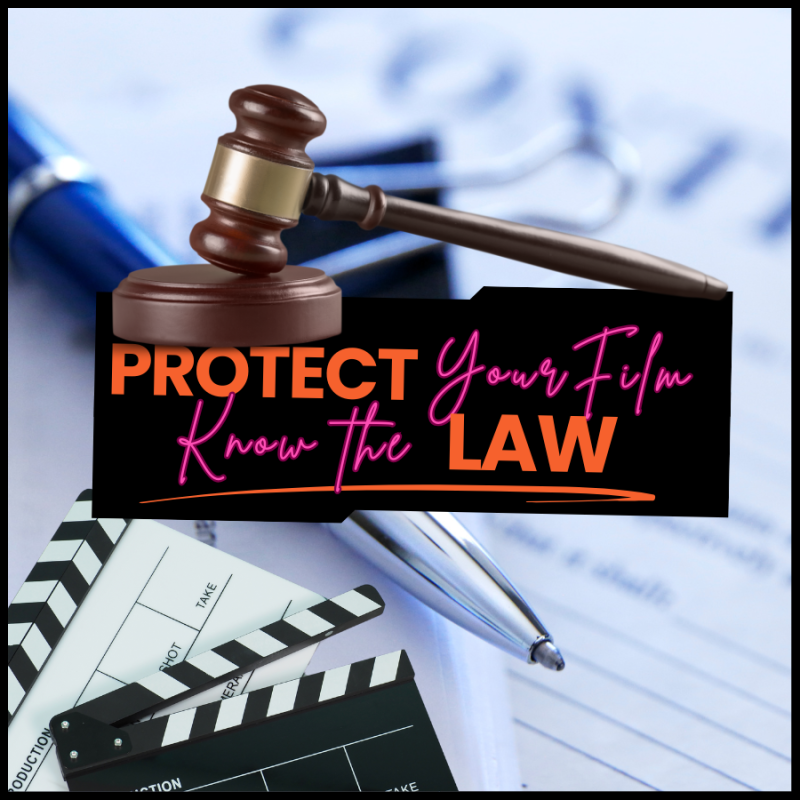When it comes to indie filmmaking, passion and creativity usually take center stage—but overlooking legal essentials can derail even the most promising project. From copyright issues to contract mishaps, legal mistakes can lead to lost funding, festival disqualifications, or worse: lawsuits.
In the independent world, where resources are limited and DIY is the norm, knowing the basics of film law isn’t optional—it’s protection. This guide breaks down the most critical legal pitfalls and how to avoid them so you can focus on what you do best: making great films.
1. Get Everything in Writing—Always
No matter how small your production is or how close you are with your team, verbal agreements aren’t enough.
🎬 Contracts are essential for:
- Cast and crew
- Locations
- Editors, composers, and VFX artists
- Production partners and co-creators
💡 Tip: Use simple, plain-language contracts that clearly state expectations, deliverables, ownership, and compensation. Many affordable or even free templates are available online for indie filmmakers.
2. Secure the Rights Before You Shoot
If your script is adapted from a book, article, or someone else’s life story, you need permission to use it.
🔑 You must obtain:
- Option Agreements (to adapt a story)
- Life Rights (for real-life stories)
- Copyright Clearance (for previously published works)
Even if you’re using a public domain story, double-check. Not all versions or adaptations are free to use.
3. Own (or License) Your Music
Music is one of the biggest legal traps in indie film. Using copyrighted music without a license can block your film from distribution—or land you in legal trouble.
🎵 Always obtain:
- Sync License (to use the song)
- Master Use License (to use a specific recording)
💡 Workaround: Hire a composer or use royalty-free or Creative Commons tracks. But even then—read the license terms carefully.
4. Location Releases Are a Must
Filming in someone’s home, business, or even on public property? Get a location release.
Why it matters:
- Prevents location owners from demanding your footage be removed
- Protects against future complaints
- Helps you qualify for insurance or distribution
Even guerrilla-style shooting can cause issues if someone recognizes their property and didn’t consent.
5. Actor and Crew Agreements
It’s not just about payment. Actor releases ensure you legally have the right to use someone’s likeness in your film.
✔️ Every person who appears on screen must sign a talent release.
✔️ Every crew member should sign a work-for-hire agreement, especially for creative roles like cinematographers or editors.
This ensures the rights to the footage, performances, and creative work stay with the production—not the individuals.
6. Avoid Trademark Infringement
Did your character wear a Nike shirt? Did you show a Starbucks cup? That’s a potential trademark issue.
🛑 Avoid using:
- Recognizable logos or branding
- Storefronts or packaging with visible trademarks
- Products with distinctive design
While some uses are covered under “fair use,” it’s a gray area that can complicate festival submissions or distribution. Best practice: blur or cover logos unless you have permission.
7. Have Insurance—Even if It’s Basic
Indie films are still professional productions. Insurance protects your shoot in case of:
- Injuries
- Equipment damage
- Location accidents
- Lawsuits
🎬 Look into:
- General Liability Insurance
- Errors and Omissions (E&O) Insurance (required for distribution)
- Production Insurance Packages for rentals or location filming
8. Understand Copyright Ownership
Who owns your film?
Unless you’ve explicitly transferred rights via contract, collaborators (writers, cinematographers, composers) may retain ownership over their contributions.
📑 Use work-for-hire clauses to ensure the project is owned by the production—especially important when submitting to festivals, licensing for streaming, or distributing the film commercially.
9. Plan for Distribution Early
Distributors, streamers, and festivals will ask for a “chain of title” before accepting your film. That means you’ll need:
- Contracts proving rights ownership
- Releases for music, locations, talent, and footage
- Legal clearance for all materials in the film
Without these, your film might never see the light of day—no matter how great it is.
Protect Your Passion
Legal protection might not be the glamorous side of filmmaking—but it’s one of the most empowering. It protects your team, your vision, and your ability to share your work with the world.
You don’t need a law degree to make a legally sound indie film—you just need awareness, preparation, and the willingness to do things right from the start.
🎬 Because in the end, it’s not just about making a film—it’s about finishing it, sharing it, and owning it.

